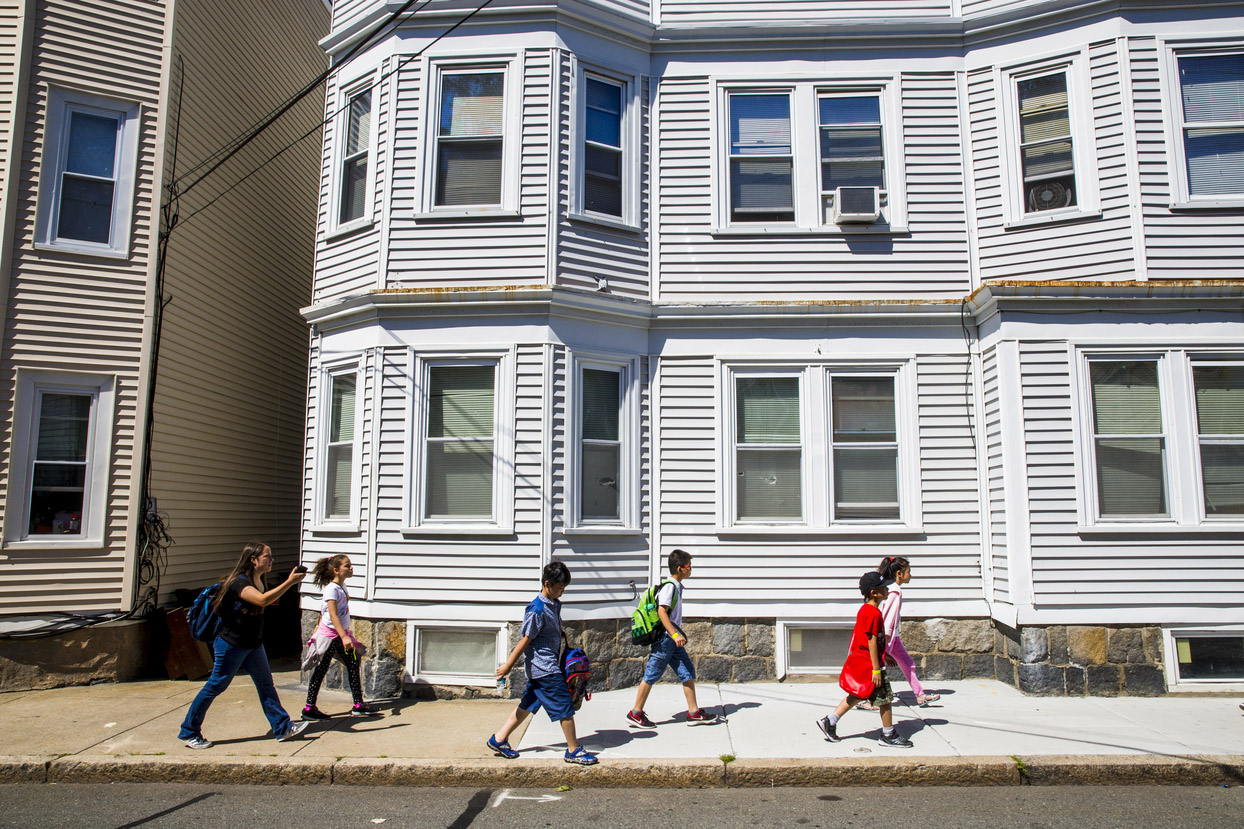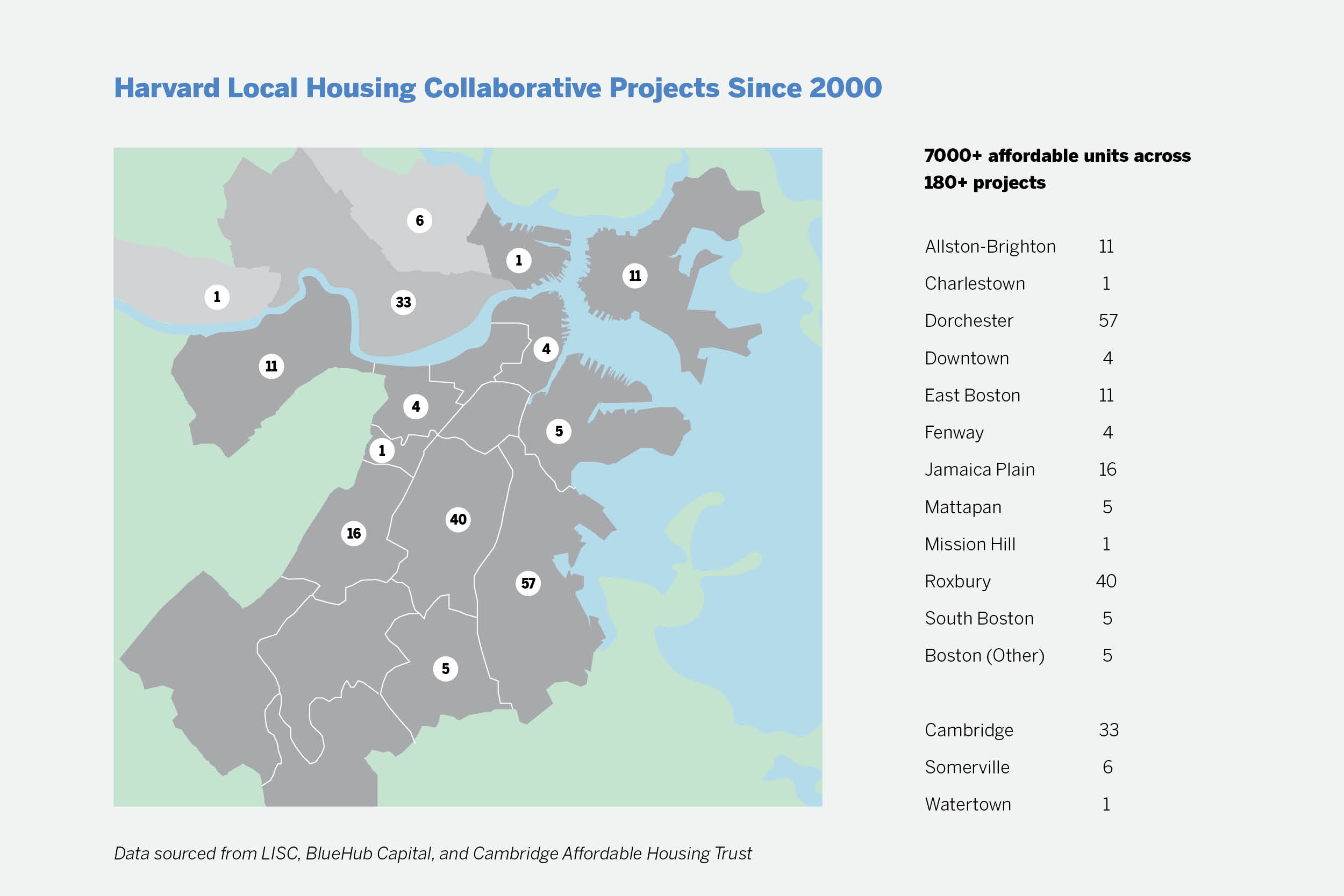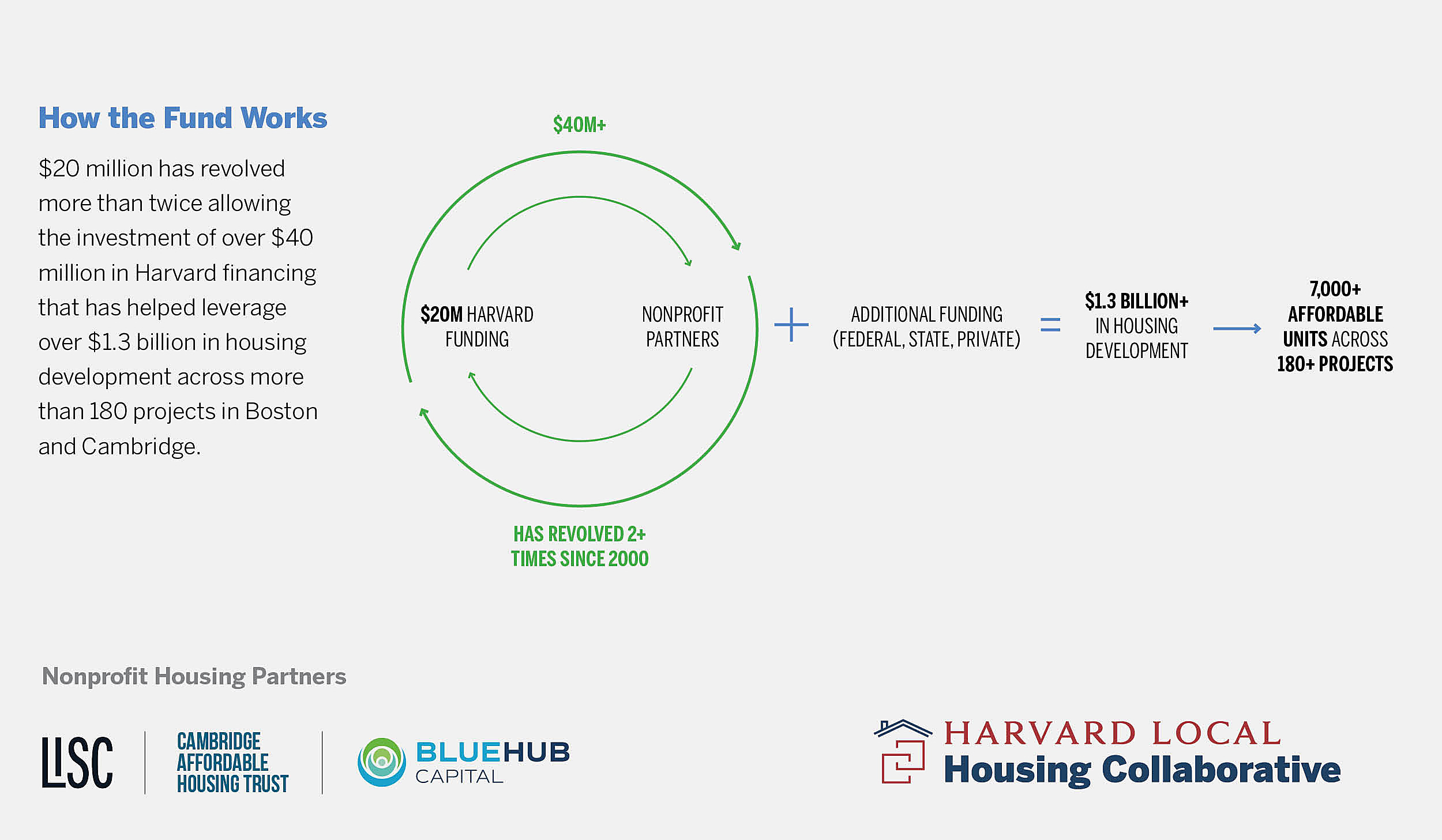Harvard recommits $20M to create local affordable housing

Rebecca Hernandez ’19 (on left) leads young campers up a Dorchester street, back to school from a field trip. Hernandez said it was on a mid-camp field trip to George’s Island that she realized her group had united. “On day one, I didn’t think it would happen and it did”, said the Texas native who came to the US from Mexico at age six. Her childhood summers at camp helped her get ahead so she could advance at school. She hopes to teach high school when she graduates from Harvard. They are all part of the Boston Refugee Youth Enrichment Summer Program (BRYE Summer) one of the Summer Urban Programs of Harvard University’s Phillips Brooks House Association…Rose Lincoln/Harvard Staff Photographer..
Rose Lincoln/Harvard file photo
Flexible, low-cost financing boosts the critical, early stages of development
When Scarlett Mitchell moved into her East Boston condo 12 years ago, her 9-year-old daughter made her promise that it would be their last move. They had been “going from place, to place, to place,” Mitchell said.
Though she was working three jobs, when she looked for an apartment she was told she didn’t make enough money to cover the rent. Owning a home? Out of the question. Mitchell says at that point in her life, “I was homeless. I literally didn’t have a place to live.”
Her story is not uncommon.
Amid a growing population, Greater Boston is facing a housing crisis that is hitting lower-income and working-class residents particularly hard. According to a new WBUR poll, many say the cost of housing is perhaps the single most pressing issue facing the region.
To help combat the problem, Harvard University is recommitting $20 million to an initiative aimed at increasing the amount of affordable housing in Greater Boston. Through the Harvard Local Housing Collaborative, the University has partnered with three local, nonprofit community-development lenders to create and preserve affordable housing, build and revitalize healthy communities, and create economic opportunities for low- and middle-income residents throughout the region.
The partners include Local Initiatives Support Corporation (LISC), BlueHub Capital (formerly Boston Community Capital), and the Cambridge Affordable Housing Trust.
Mitchell, who moved to the U.S. from Venezuela 31 years ago and now works as a preschool teacher in the Boston Public Schools, was able to get into her condo with assistance from the East Boston Neighborhood of Affordable Housing (NOAH) nonprofit and behind-the-scenes support of LISC and BlueHub.

Daniel Hassett-Salley/Harvard Staff
“Someone at my church told me about NOAH. With their help, I was finally able to qualify. I went through the process, I won the housing lottery … I became the very first homeowner in the [Falcon-Border] complex,” she said. “I’ve been here 12 years now. I’m very happy. My children finished high school. My daughter is in college now. I got my bachelor’s degree, and I’m working on my master’s. I have all that I was looking for. I’m so appreciative and grateful for everyone who made this possible for me. I have a have a home, a place to call my own.
“I wish there were more affordable housing complexes like this. There are so many people who are just like I was,” Mitchell continued, “people who are trying so hard to look for a place to live, but they just can’t afford the rent anymore.”
Though the housing problem has grown more acute in recent years, Harvard launched its program, formerly known as 20/20/2000, in 2000, initially committing $20 million in low-interest, flexible loans. Since then, the fund has revolved more than two times, and has helped finance the preservation and creation of more than 7,000 units of affordable housing locally.
The crucial recommitment ensures that the funding continues for at least the next two decades.
“Harvard is pleased to renew the Harvard Local Housing Collaborative. We are proud to be part of a community where partners from across Greater Boston come together to strengthen the region and address the urgent need for quality, affordable housing,” said Harvard President Larry Bacow. “We are grateful to all of our partners for their support and their efforts to increase access to homeownership and promote fair and equitable access to housing.”

Daniel Hassett-Salley/Harvard Staff
The program’s impact can be felt throughout the region. It has helped leverage more than $1.3 billion in housing developments with more than 5,500 affordable units in Boston and more than 1,600 affordable units in Cambridge. The program has also helped finance additional housing developments in Somerville and Watertown.
The financing that is provided through the Harvard Local Housing Collaborative is flexible, low-cost, and available at the critical early stages of development — such as during land acquisition and predevelopment — making it a particularly attractive, and oftentimes crucial, element for developers.
“Harvard has been a supportive housing partner to LISC for two decades, and we are thrilled to renew our partnership through the Harvard Local Housing Collaborative. It takes a civic partner who is invested in our communities to make flexible funds available at low cost on a long-term basis to drive housing affordability. Our region’s income disparity and housing affordability challenges have grown to crisis levels since our partnership began in 1999. We need the engagement and investment of anchor institutions like Harvard to take our response to this crisis to another level,” said Karen Kelleher, executive director of LISC Boston.
Projects throughout the region include affordable apartments, cooperative housing, assisted living for low-income seniors, opportunities for first-time home-buyers, artist’s lofts, and even shelters. Many are adjacent to public transportation and include easy access to public green space.
Leaders in both Cambridge and Boston have continued to make affordable housing creation a priority.
Cambridge is grappling with how to expand opportunities for affordable-housing development in all neighborhoods in a way that ensures a diverse and vibrant city. The City Council is mulling over an idea for a new zoning law, with the goal of helping housing developers create new affordable units more quickly, more cost-effectively, and in areas where there are fewer affordable housing options for residents.
Whether or not the city’s proposal moves forward, Harvard’s housing fund, with its access to early capital, has been a critical driver in helping Cambridge and its nonprofit developers address the crisis.
“The University is an exceptional partner in our public education, sustainability, and affordable-housing efforts,” said Cambridge City Manager Louis A. DePasquale. “Harvard’s affordable-housing initiative has directly impacted thousands of residents throughout our city.”
Boston has set a goal of creating 69,000 affordable units by the year 2030.
“Creating more quality, affordable housing for a range of incomes is essential to preserving the diversity that makes Boston the incredible city that it is, and is the backbone of Mayor [Martin J.] Walsh’s housing policy. Twenty years ago, Harvard stepped up to create this fund, providing early investment in the development process that has been a crucial element in many successful affordable developments,” said Sheila Dillon, the chief of housing and director of neighborhood development for the city of Boston. “Harvard’s continued partnership and investment in affordable housing in Boston has not only been innovative but is also a wonderful example of how a private organization can have a meaningful impact on the lives of thousands of Bostonians.”
“Harvard’s program, providing access to capital, is an important partnership to allow affordable-housing creators to be competitive in the development market, and then build or preserve much-needed affordable housing options,” said Rep. Kevin G. Honan, chair of Massachusetts’ Joint Committee on Housing. “It’s an innovative program that’s making a tangible difference in neighborhoods across our city, and throughout the region. I’m pleased to learn that this transformative program will continue for another 20 years.”
Harvard’s recommitment follows the launch of an initiative last week by Boston Children’s Hospital and Brigham and Women’s Hospital, both Harvard teaching hospitals, together with Boston Medical Center, designed to help local families pay their rent. The three hospitals, acknowledging the strong connection between stable housing and good health, pledged to spend approximately $3 million over three years to fund housing programs designed to prevent displacement, eviction, and homelessness.
Besides bolstering the health of individuals, housing stability contributes to strengthening communities and combating a range of social and economic problems.
“I feel like I belong here,” said Mitchell. “I belong to this community. This is my home. My building. It’s perfect for me. I’m so blessed.”




